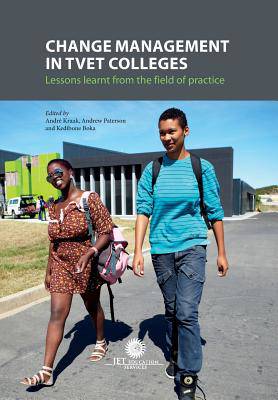
- Afhalen na 1 uur in een winkel met voorraad
- In januari gratis thuislevering in België
- Ruim aanbod met 7 miljoen producten
- Afhalen na 1 uur in een winkel met voorraad
- In januari gratis thuislevering in België
- Ruim aanbod met 7 miljoen producten
Change Management in TVET Colleges
Lessons Learnt from the Field of Practice
Andre Kraak, Andrew Paterson, Kedibone BokaOmschrijving
The Technical and Vocational Education and Training (TVET) college environment is marked by increasingly stark juxtapositions between what needs to be achieved in the post-school education sector and the increasing difficulty of current conditions. The 'triple challenge' of poverty, inequality and unemployment weighs heavily on the social, political and economic fabric of the country and expectations are high that the TVET colleges can make a pivotal contribution to counter these challenges. Despite laudable increases in TVET enrolment, the education system needs to work harder to accommodate the weight of demand for post school further education and training (FET) band qualifications from young people not in education, employment or training. At the same time, it is vital to secure adequate quality in TVET programmes which depend so much on the competence and commitment of college lecturers. This collection offers a set of research papers that provide new analytic and empirical material on:
- The political economy of TVET types in different countries which, by comparison, illuminate the South African case;
- A periodisation of government interventions in the TVET sector over the last three decades;
- The unsettled state and status of TVET lecturers in relation to their job requirements and conditions of service;
- The halting evolution of collegial relationships between college lecturers towards higher collegiality;
- Employer expectations of college graduates and how colleges are responding; and
- An analysis of the outcomes of a college improvement intervention in Limpopo and the Eastern Cape.
This book will offer valuable information and insights for decision-makers as well as analysts of institutional change concerning links between education and economic growth, with particular regard to TVET graduates' employment rates.
Specificaties
Betrokkenen
- Auteur(s):
- Uitgeverij:
Inhoud
- Aantal bladzijden:
- 144
- Taal:
- Engels
Eigenschappen
- Productcode (EAN):
- 9781928331339
- Verschijningsdatum:
- 27/07/2016
- Uitvoering:
- Paperback
- Formaat:
- Trade paperback (VS)
- Afmetingen:
- 170 mm x 244 mm
- Gewicht:
- 240 g

Alleen bij Standaard Boekhandel
Beoordelingen
We publiceren alleen reviews die voldoen aan de voorwaarden voor reviews. Bekijk onze voorwaarden voor reviews.









